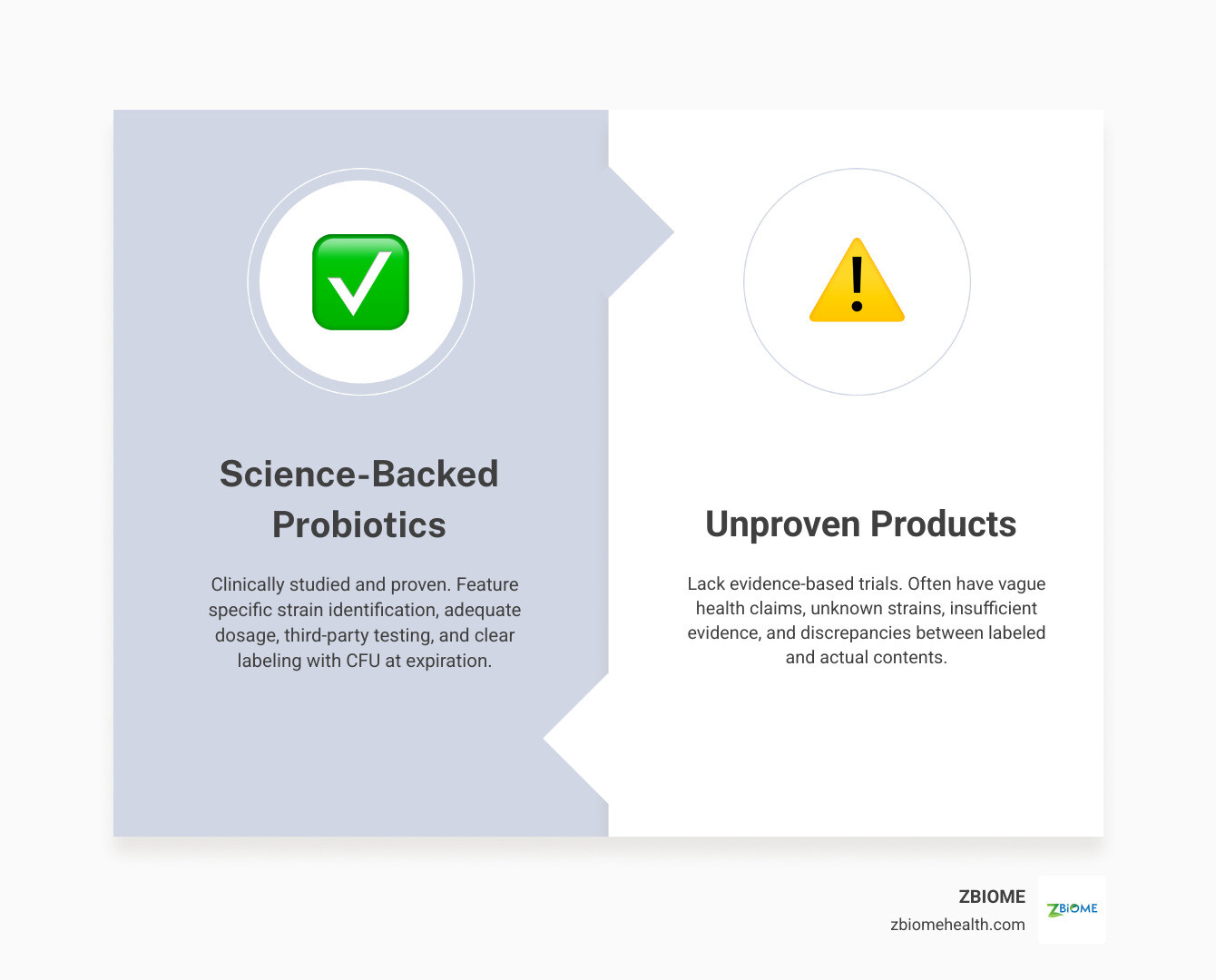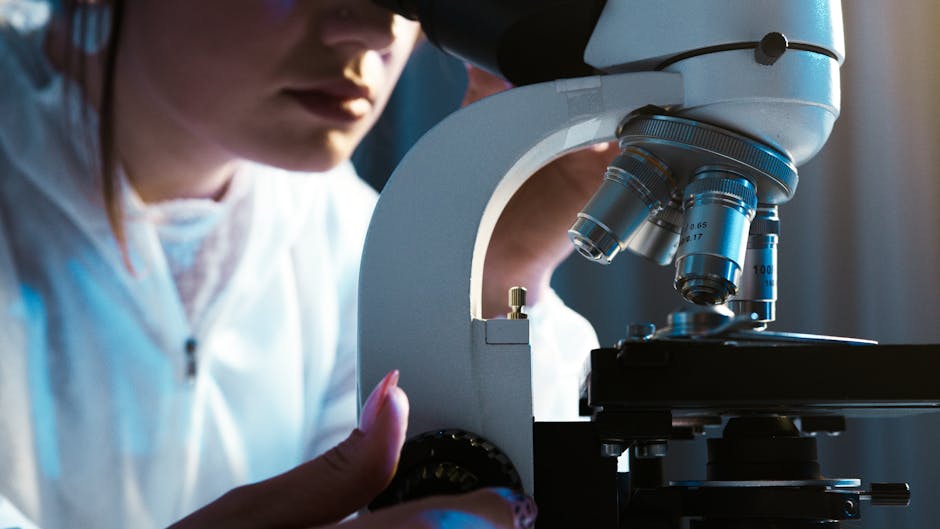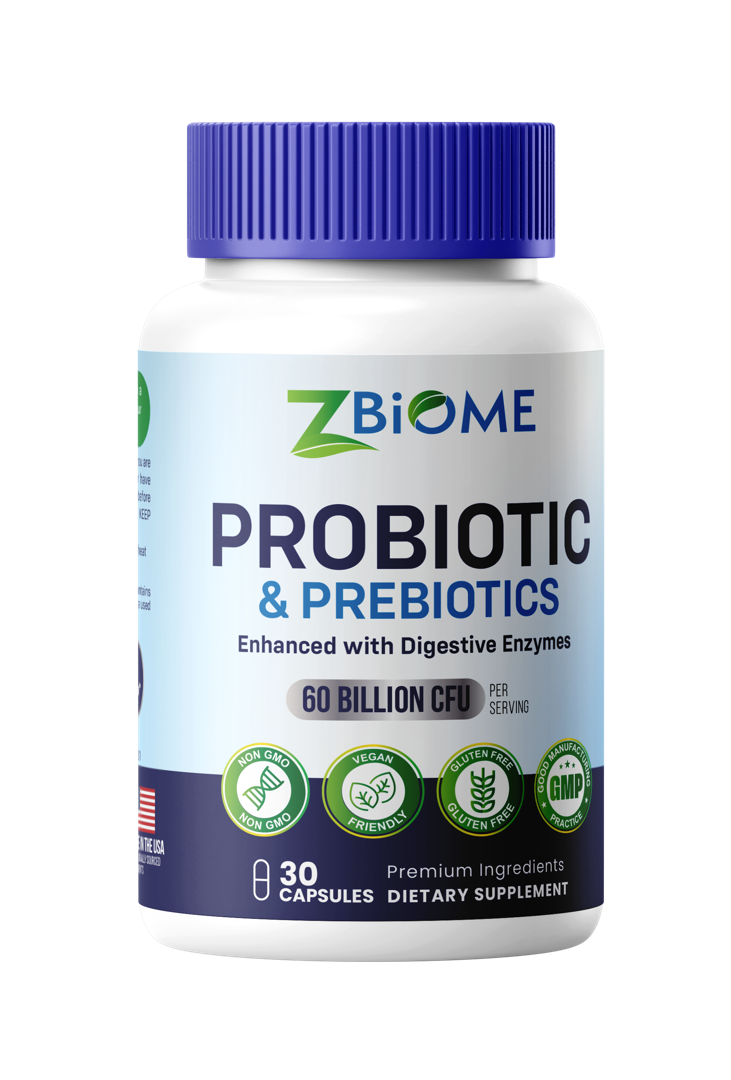Why Science-Backed Probiotics Matter More Than Ever
Science backed probiotics are live microorganisms clinically proven to provide health benefits when consumed in adequate amounts. With the global probiotic market reaching $35 billion in the US and usage as high as 25%, consumers face a daunting task choosing the right product.
Key indicators of a quality probiotic include:
- Specific strain identification (genus, species, and strain)
- Clinical trial evidence for your specific health concern
- Adequate dosage (typically 10^8 to 10^9 CFU daily)
- Third-party testing and quality control
- Clear labeling with CFU count at expiration
The challenge is that most products lack evidence-based trials, and studies find discrepancies between labels and actual contents. This confusion stems from the fact that probiotic effects are highly strain-specific. A strain that works for one condition may have zero effect on another.
I'm Tarek El Ali, a healthcare consultant with experience in pharmaceuticals and immunology, including training from Harvard Medical School. My work focuses on translating complex clinical research into actionable strategies, particularly around science backed probiotics and their role in improving patient outcomes.

Simple science backed probiotics word guide:
Understanding Probiotics: More Than Just "Good Bacteria"
Your body is home to about 38 trillion microbes that make up your microbiota, working around the clock to keep you healthy. From digestion to immune support, these microscopic helpers are vital.

So what are probiotics? The official definition from ISAPP and the WHO is: "live microorganisms that, when administered in adequate amounts, confer a health benefit on the host." This sets a high bar. To be a true probiotic, a microorganism must be properly identified (genus, species, and strain) and scientifically proven to provide real health benefits. This is what separates science backed probiotics from products with vague claims.
You'll find these microbes in fermented foods like yogurt, kefir, kimchi, kombucha, and sauerkraut, and as dietary supplements. The goal is to maintain a healthy microbial community or restore it after a disruption.
Want to see this explained visually? Check out this video: What is a probiotic?
What's the Difference Between Probiotics and Prebiotics?
It's easy to mix these up, but they have different jobs.
- Probiotics are the live, beneficial bacteria themselves.
- Prebiotics are the food for these bacteria, typically special types of fiber that act like fertilizer for your good microbes.
When combined in one product, they're called a synbiotic. The prebiotics help the probiotics thrive, creating a synergistic effect that's more powerful than either alone. You can learn more from the ISAPP consensus on prebiotics.
How Do Probiotics Work?
Probiotics use several clever strategies to keep you healthy, with mechanisms often depending on the specific strain.
- Balance the Gut Community: They act like peacekeepers, restoring harmony after disruptions from antibiotics, illness, or diet changes. They compete with harmful bacteria for nutrients and space, sometimes producing substances that inhibit them directly.
- Aid Digestion and Nutrient Absorption: They break down complex carbohydrates your body can't, making more nutrients available. Some strains even produce essential vitamins like B vitamins and vitamin K right in your gut.
- Strengthen the Gut Barrier and Immune System: Probiotics help maintain the integrity of your gut lining, which acts as a protective wall. Since about 70% of your immune system is in your gut, they are perfectly positioned to interact with immune cells and support your body's defenses, potentially reducing the risk of respiratory tract infections.
The Proof is in the Science: Unpacking the Health Benefits
Science backed probiotics aren't just a health trend; they are products with solid evidence to support their claims. It's the difference between hoping something works and knowing it does.

The most important thing to understand is that not all probiotics are created equal. Their effects are incredibly strain-specific. A benefit proven for one strain of Lactobacillus can't be assumed for another, even from the same family. Probiotics are also often dose-dependent, meaning a certain amount (measured in CFU) is needed to see real benefits.
This video breaks down the health benefits: Health benefits of probiotics explained
The Evidence for Specific Conditions: What Do Science-Backed Probiotics Help With?
The strongest evidence for probiotics comes from studies on specific health conditions.
- Antibiotic-associated diarrhea (AAD): This is a major success story. Certain probiotics can reduce the risk of AAD by about 51%. Strains like Saccharomyces boulardii and Lactobacillus rhamnosus GG are particularly effective.
- Acute diarrhea in children: For diarrhea caused by rotavirus, Lactobacillus rhamnosus GG and Saccharomyces boulardii can help shorten the duration of episodes.
- Irritable Bowel Syndrome (IBS): While results vary, meta-analyses suggest probiotics can reduce the risk of persistent IBS symptoms by about 21%. Strains like Bifidobacterium infantis 35624 and Lactobacillus plantarum 299v have shown promise for reducing pain and bloating.
- Immune function: Research suggests probiotics may reduce the risk of respiratory tract infections and shorten their duration.
- Other conditions: Specific strains may benefit preterm infants (under medical supervision) and women with recurrent UTIs or bacterial vaginosis.
For more details, this systematic review on probiotics for GI symptoms offers comprehensive insights.
Are All Probiotics the Same?
Absolutely not. The benefits are tied to the strain level. A strain's full name includes its genus, species, and a unique alphanumeric code (e.g., Lactobacillus rhamnosus GG). This specific strain is what researchers study for particular health benefits. A strain that helps with AAD might do nothing for IBS. This is why reading labels for specific strain names is crucial.
Here are some common, well-researched strains and their primary uses:
| Strain | Common Use Cases |
|---|---|
| Lactobacillus rhamnosus GG | Antibiotic-associated diarrhea, pediatric diarrhea |
| Lactobacillus plantarum 299v | IBS symptoms (abdominal pain, bloating) |
| Bifidobacterium longum 35624 | IBS symptoms, overall gut comfort |
| Saccharomyces boulardii I-745 | Antibiotic-associated diarrhea, traveler's diarrhea |
The key takeaway is to always look for the specific strain designation on the label. That's where the real research lives.
Want to see this concept explained visually? Check out this helpful video: Video on probiotic strain differences
How to Choose a Truly Science-Backed Probiotic Supplement
Walking into the supplement aisle can be overwhelming. With hundreds of products, how do you separate the real deal from marketing fluff? Choosing a truly science backed probiotic is easier when you know what to look for. Think of yourself as a detective examining the evidence on the label.

Decoding the Label: What to Look for in Science-Backed Probiotics
Your probiotic label is a map to genuine health benefits. Here are the essential elements to check:
- Complete Strain Identification: The label must show the genus, species, and strain (e.g., Lactobacillus rhamnosus GG). Without the specific strain, you're buying a mystery product.
- Colony-Forming Units (CFU): This number indicates how many live microorganisms are in each dose. Effective doses range from 1 billion to 50 billion CFU, depending on the strain and health goal.
- Guaranteed Potency: The CFU count should be guaranteed at expiration, not just at the time of manufacture, to ensure you're getting a viable product.
- Third-Party Testing: Look for certifications or mentions of Good Manufacturing Practices (GMP) as a sign of quality control and independent verification.
- Storage Requirements: Follow instructions for refrigeration or shelf storage to keep the cultures alive and effective.
For a comprehensive guide, check out this resource on How to read a probiotic label.
Understanding Dosage and Regulation
The phrase "adequate amounts" is critical. The CFU count on your label determines whether you'll see real benefits. There's no one-size-fits-all dose; it must match what was used in clinical trials for your specific health concern.
The regulatory landscape adds complexity. Most probiotics are dietary supplements, which have fewer pre-market requirements than prescription drugs. They can make general claims like "supports digestive health" without FDA approval, but cannot claim to treat specific diseases. While Good Manufacturing Practices (GMP) exist, enforcement can be inconsistent, making it vital to choose reputable brands with third-party testing.
For more details, you can explore the FDA guidance on labeling.
Using Evidence-Based Tools
To cut through the marketing noise, use evidence-based tools to find clinically proven options. Resources like "The Clinical Guide to Probiotic Products" are invaluable. These independent guides organize products by health condition and grade the scientific evidence (Level I being the strongest).
Using these guides helps you identify products with real clinical backing for specific indications, changing your selection from a shot in the dark into a data-driven health decision. You can find General information on clinical guides to probiotics to learn more. Armed with this knowledge, you can choose products that deliver real, science backed benefits.
Safety, Side Effects, and Special Considerations
For most healthy people, science backed probiotics have an excellent safety profile. When side effects do occur, they are typically mild and temporary, such as gas or bloating during the first week as your gut microbiome adjusts.
However, extra caution is necessary for certain high-risk populations. While beneficial for most, these live microorganisms can pose risks in specific situations.
- Immunocompromised individuals, such as those with HIV/AIDS, undergoing cancer treatment, or on immunosuppressive drugs, should be cautious. A weakened immune system may struggle to keep even "good" bacteria in check.
- Critically ill patients, especially those with central venous catheters, are also at a small but real risk of infection if bacteria from probiotics enter the bloodstream.
- The situation with premature infants is complex. While some strains show promise for preventing serious conditions, the FDA has issued warnings about potential risks in this extremely vulnerable group.
Bottom line: if you have an underlying health condition, take immune-suppressing medications, or are considering probiotics for an infant, please talk to your healthcare provider first. They can help you weigh the potential benefits against any risks for your specific situation. This isn't to scare you away from probiotics, but to encourage smart, informed decisions.
For more detailed information on safety, the Mayo Clinic on probiotic research provides excellent, evidence-based insights.
Frequently Asked Questions about Science-Backed Probiotics
We get these questions all the time. Let's explore what really matters when considering science backed probiotics.
Should healthy individuals take probiotics?
There's no simple yes or no. The evidence is strongest for specific health conditions like AAD or IBS. For generally healthy people, the evidence for disease prevention isn't strong enough for a universal recommendation. However, probiotics can support gut health maintenance and microbiome resilience against modern stressors like processed foods and stress. A diverse, fiber-rich diet is always your best first step. Adding a supplement is a matter of personalized nutrition and your individual goals.
How long does it take for probiotics to work?
This isn't an overnight fix. The timeline depends on your goal and the strain. For acute issues like antibiotic-associated diarrhea, you might see improvements in a few days. For chronic conditions like IBS, it can take weeks or even months to notice significant changes. Consistency is key. Your diet, lifestyle, and unique microbiome also influence the response. Most experts suggest giving a probiotic at least a month, and potentially two to three months for chronic issues, to see results.
Can you get enough probiotics from food alone?
Fermented foods like yogurt, kefir, and kimchi are fantastic for your gut. They provide a natural source of beneficial microbes. However, the CFU count and specific strains in food are highly variable and often unverified. You don't know exactly what you're getting. For general gut health, fermented foods are great. But if you need a targeted, clinically-studied strain with a guaranteed dose for a specific condition, a high-quality supplement is often a more reliable choice. The best approach can be a combination of both.
Conclusion: Making an Informed Choice for Your Gut Health
Navigating science backed probiotics is simple once you know the fundamentals. The most important lesson is that strain specificity matters more than anything else. A benefit tied to Lactobacillus rhamnosus GG doesn't apply to other strains.
Your north star should be clinical evidence for your specific health concern. Don't settle for vague claims. Learn to decode labels by checking for the full strain name, a CFU count guaranteed at expiration, and third-party testing. These details separate quality products from the hype.
The future of gut health is moving toward personalized probiotics, and it's an exciting time in the field.
At ZBIOME Health, we've seen the confusion and high costs people face. That's why we created an all-in-one formula that removes the guesswork. Our product combines 60 Billion CFU of carefully selected probiotics with 9 digestive enzymes and 4 prebiotics, giving your gut comprehensive support in one simple package for just $27.
We believe everyone deserves access to science backed gut health without the high price tag or supplement roulette. Your journey to better gut health should be empowering.
Ready to try a comprehensive approach? Explore ZBIOME's all-in-one gut health solution and find what happens when science meets simplicity.




